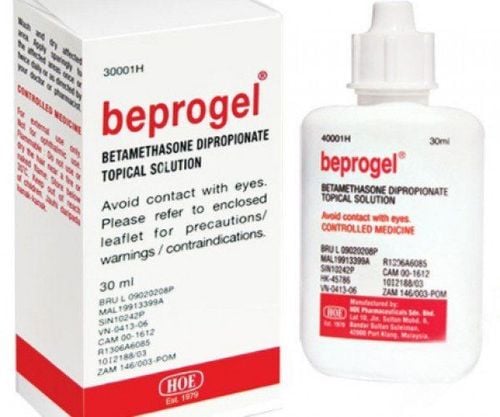This is an automatically translated article.
How fast or slow the wound heals depends on many different factors. However, nutrition plays a very important role in the healing process of wounds. Certain foods should be avoided as they can slow the healing of open wounds and leave scars.
1. What is an open wound?
Open wounds are visible wounds such as lacerations, punctures, cuts or incisions, etc. Signs of an open wound include bleeding, redness, and swelling around the wound. .. Besides, the patient will feel pain and discomfort on the surface of the skin. The wound healing process will go through 3 stages which are:
Inflammatory phase: Blood vessels will tighten to prevent blood loss and platelets from clumping together to form blood clots. White blood cells move to the site of injury to destroy bacteria and other allergens. Fibroblast phase: Protein, collagen fibers begin to grow inside the wound. The growth of collagen will help stimulate the edges of the wound to contract and close. At the wound site, small blood vessels form to supply blood to the newly created skin cells. Regenerative phase: The body continues to replenish collagen and refine the injured area and help the scar fade. In addition to proper care and treatment of open wounds, nutrition is also very important. During the wound healing process, if the patient has the right nutrition, this process will take place quickly and without leaving scars.
Trắc nghiệm dành riêng cho người mắc đái tháo đường: Chế độ ăn của bạn đã hợp lý chưa?
Người bị bệnh đái tháo đường cần phải quan tâm nhiều hơn đến cách tính toán khẩu phần ăn sao cho phù hợp với nhu cầu và tình trạng sức khỏe. Nếu chưa rõ, bạn có thể tìm hiểu kỹ hơn thông qua bài trắc nghiệm ngắn sau đây.2. When you have an open wound, what should you not eat?
Some foods to avoid when having an open wound include:
Sugar and foods with high sugar content: Sugar has an impact on collagen located on the surface of the epidermis. Especially in the fibroblast and regenerative phase of open wounds, using sugar will slow this process down and the wound will take longer to heal. Ginger: Excessive use of ginger will hinder the formation of blood clots during the inflammatory phase. Skimmed Milk: Skimmed milk can affect the body's production of insulin and the body's natural inflammatory response. Therefore, using skimmed milk will affect the inflammatory phase, affect the formation of blood clots and slow down the healing process. Dog meat: Dog meat contains a lot of protein and energy. Therefore, in the regeneration phase of the wound, when the skin is in the healing process, using foods high in protein will lead to keloid, lumpy and hard scars. Beef: is a nutritious food, but it darkens the wound and forms deep scars. Smoked meat: Can deplete essential vitamins and minerals in the body needed for cell regeneration. Eggs: During the wound regeneration stage, young skin is gradually forming, while eggs have properties that promote the proliferation of collagen fiber tissue. Therefore, if you eat eggs, keloids will form in the wound. Water spinach: Water spinach is a favorite food of many people with its cool properties, good detoxification, diuretic, laxative and skin-producing properties, etc. So, if you eat water spinach, it will leave keloids for the wound. Chicken: Makes the wound slow to heal and itch. Seafood, fishy foods: These are all nutritious foods for the body. However, when there is an open wound, seafood or fishy foods will cause itching and discomfort for the patient. Dishes made from glutinous rice: Sticky rice is a favorite dish of Vietnamese people. However, dishes from glutinous rice have the characteristics of being easy to heat, making the wound become more swollen and festering during the inflammatory phase. In addition, if you eat sticky rice regularly during the regeneration phase, it can lead to keloid scars.

Ăn rau muống sẽ để lại sẹo lồi cho vết thương.
3. How long is the diet?
Depending on the severity of the open wound and the location of each person, the diet time will be different. For minor wounds, it can usually take 5-7 days, which is enough time to rebuild damaged tissues. Patients can monitor with the naked eye through signs such as healed wounds, dryness, young skin, ... to rebalance nutritional needs. For serious wounds such as incisions, the patient should follow the doctor's instructions and consult the nutritionist's diet.
In order for the wound to heal quickly, the patient needs to follow the instructions of the medical staff such as proper wound care daily, add water and vitamin C, absolutely do not scratch or have a negative impact. wound,... In addition, dieting can reduce nutrients from the diet. Excessive abstinence will adversely affect health and even be counterproductive. So. Patients should consult and consult a nutritionist to have a suitable diet.
In summary, the wound healing process has many influencing factors. In addition to proper wound care and hygiene, patients need to have a proper nutrition regimen and avoid foods that affect wound healing. When there are serious open wounds, patients should go to a medical facility for advice on appropriate nutrition.
Usually minor injuries that cause little bleeding are usually not serious. However, if the injury is in dangerous locations, there is a great risk of infection, the patient should go to the nearest medical facility to be examined by a doctor and have a timely intervention direction.
Vinmec International General Hospital with a system of modern facilities, medical equipment and a team of experts and doctors with many years of experience in medical examination and treatment, patients can rest assured to visit. examination and treatment of skin tears at the Hospital.
Please dial HOTLINE for more information or register for an appointment HERE. Download MyVinmec app to make appointments faster and to manage your bookings easily.













